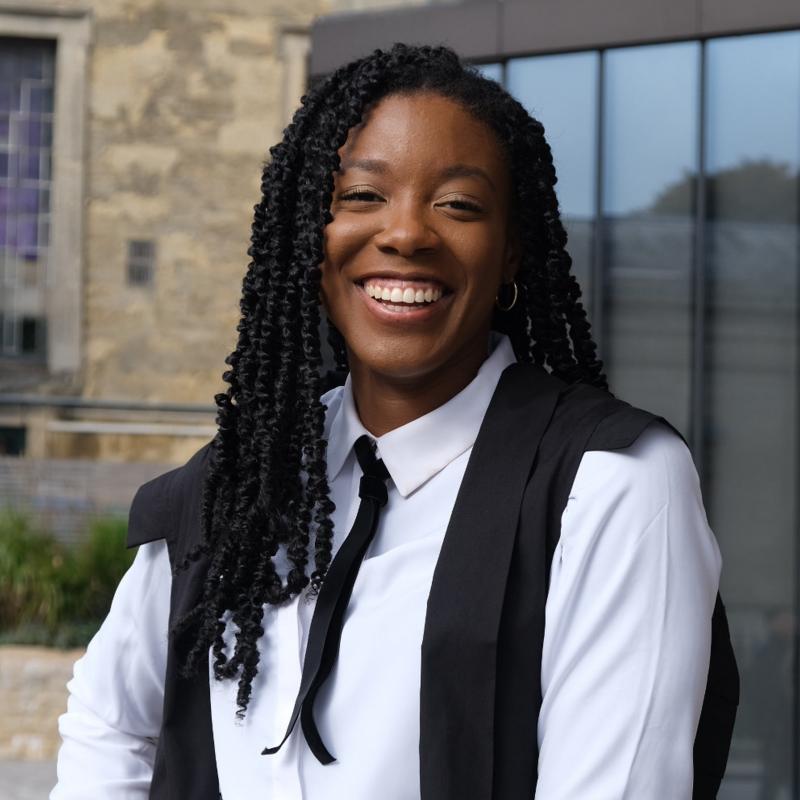Breadcrumb
Veniecia Laylor (MPP 2020) is pursuing the Master of Public Policy (MPP) to deepen her understanding of the policymaking process and bridge the gaps between research and practice.
She is the Blavatnik School’s first recipient of the All Souls Hugh Springer Graduate Scholarship (see more details of this scholarship and others). As with a number of University-wide scholarships, eligible applicants are automatically considered once they have applied for the MPP (further information on MPP fees and funding is available on our MPP webpages). “I feel enormously grateful to receive this funding,” Veniecia says. “It’s a privilege which enables me to learn without the distraction of financial worries.”
At the Blavatnik School, learning opportunities come both from within the classroom and outside of it:
“On the MPP, you find people who share your passions, people you disagree with, people who broaden your perspectives – it’s a truly inspiring community.”
Her main policy interest – welfare and social policy – took shape during an internship with Amnesty International USA, where she worked on a project to improve access to reproductive healthcare services for indigenous women in the US. “I recognised that you need policymakers engaged at various levels in order to drive lasting and effective change – particularly on non-voting issues and those that affect marginalised communities.”
Having witnessed reluctance from many US Congress members to engage with the issue, Veniecia was keen to develop a deeper understanding of the policymaking process, including the obstacles faced by policymakers. After her undergraduate degree, she moved to roles in Canada’s federal government – in the Prime Minister’s Office and later in the Associate Finance Minister’s Office. She worked on diverse projects, including ongoing efforts to develop a ‘quality of life’ framework to enable Canada to pursue economic growth that is more inclusive, sustainable and equitable.
Having been exposed to the multi-layered, intersecting nature of policymaking at the government level, Veniecia is using the MPP to finetune her skills for working in such environments.
“I view policymaking as a craft, where you have to weave together various dimensions: your knowledge and skills, data and evidence, the human experience, different political considerations and relationship management. The MPP merges these dimensions and gives you numerous opportunities to apply your skills through case studies and the summer project.”
The applied elements of the course were key to Veniecia’s decision to study at the Blavatnik School. During her time working in government, she observed a gap between the worlds of policy in academia and in practice. “Often researchers don’t know how to communicate findings to policymakers, or they aren’t doing research of interest to policymakers; on the other hand, policymakers aren’t looping in researchers to support and improve the quality of their work. The MPP and the whole Blavatnik School seeks to address this gap – and I know it’s working because we put the lessons into practice through regular case studies.”
Veniecia is further developing her skills as a researcher, producer and correspondent for the MPP student podcast, Oxford Policy Pod. “For many people, policy can seem detached from their everyday lives, but it affects us all deeply every day. I wanted to be part of making policy accessible, so you don’t need to have an extensive policy background to listen and learn. It’s also been a great opportunity to learn about issues that go beyond my main policy interests.”
For Veniecia, the opportunity to understand how core decision-making principles apply to specific policy areas has been a valuable aspect of the MPP. She cites examples from the economics module (one of the core modules which students take in Michaelmas term), which examined how economic principles underpin specific aspects of healthcare, education and climate policy. “While I usually take a more human-centred approach to welfare policy, I now have a better understanding of the economic models and explanations that guide government decision making in this area – this is invaluable for understanding how to drive policy change.”
Veniecia is looking forward to using the summer project to explore a policy issue in further detail. Until then, she is set on making the most of her time in Oxford: “It’s rare to be in an environment where you’re constantly learning. I feel like I’ve grown so much as a person in such a short space of time.”
March 2021
Veniecia is an All Souls Hugh Springer Graduate Scholar

